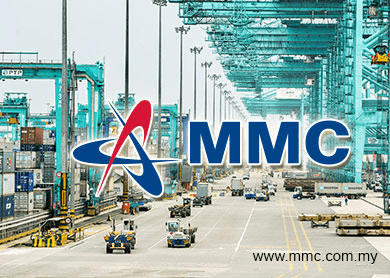
COME June this year, Datuk Seri Che Khalib Mohamad Noh would have held the reins of MMC Corp Bhd for four years. In a candid interview, the 51-year-old corporate leader shares with The Edge what it is like to run the Tan Sri Syed Mokhtar Albukhary-controlled conglomerate. The following is an excerpt from the interview.
The Edge: What is it like to run a conglomerate like MMC compared with TNB (Tenaga Nasional Bhd)?
Datuk Seri Che Khalib Mohamad Noh: TNB is a government-linked company (GLC). The main difference is that at TNB, we spent a lot of time on stakeholder management while at MMC, I focus a lot on business strategy and expansion. The decision-making is also easier as we have to refer to only one particular decision-maker. At a GLC, because there are too many directions to listen to, the decision-making process is longer than in the private sector. For me, it is okay because I have worked with three entrepreneurs and also served the government before; all have their pros and cons. At the end of the day, as a professional manager, I just have to make the best of the situation.
Would you say that PTP (Pelabuhan Tanjung Pelepas) is on a par with Singapore in terms of efficiency
We could do better but consistency in delivery is an issue that we are addressing now. There is room for improvement and we are working hard at it. I am confident we can do it.
Are you facing operational issues at PTP?
We had a technical issue in early 2016 due to the shortage of foreign workers. However, that has been resolved. We have also recently appointed a new German CEO (Marco Neelson) to improve our port efficiency, and are spending about RM1 billion on replacing and upgrading our cranes.
What do you think about the concerns over MMC’s high gearing?
A lot of people see MMC’s massive debt as a problem but most of our debt is project-financed. For example, at MMC level, our total debt is RM26 billion, but of that, RM17 billion is under Malakoff and RM2.6 billion under PTP. The rest is very small. At the corporate level, it is only RM3.5 billion ... we don’t have borrowings at shareholders’ level. Borrowings are all at the operating companies and they can generate enough cash [to service the debts] as they are all making profit.
You mentioned that there is no hurry for an IPO (initial public offering). Why?
There is no rush for a listing ... maybe at the end of next year. We recognise though that if we don’t list, we may not grow as fast as we want to.
Some analysts say corporate governance and related-party transactions (RPTs) are risks to MMC. What are your views on that?
These days, it is not as simple [to undertake RPT] as it was in the 1990s. For instance, if we want to buy Penang port now, we have to go through due diligence. If we bought Penang port, we would have to hold an EGM (extraordinary general meeting), we need to open the books to allow the shareholders to look at the transaction and we would [have to] show them that it is a good buy. Now, everything has to be transparent. I think corporate governance is not something companies can take lightly today because there is enough system to govern it.
Is what MMC is today within your expectation?
Definitely, it is better. From an operational point, we are a lot better today compared with before. Moving forward, we think we will be better because of the improvements at the ports. We also have steady businesses in Gas Malaysia Bhd and Malakoff Corp Bhd.
Although all new power plants are being given out through direct negotiations, we still believe that if there were a call for tender for new capacity, Malakoff could be very competitive. This is because it has the advantage of location, sites and readily available infrastructure. It is not easy to put up additional coal power plants today due to environmental issues. We still have three sites that can accommodate an additional capacity of 1000mw each.
As the government has acknowledged the need to provide infrastructure to support the demand fro gas, Gas Malaysia will slowly expand its distribution network, first to Perak and then to Melaka, Negri Sembilan and Johor, among others.
Save by subscribing to us for your print and/or digital copy.
P/S: The Edge is also available on Apple's AppStore and Androids' Google Play.